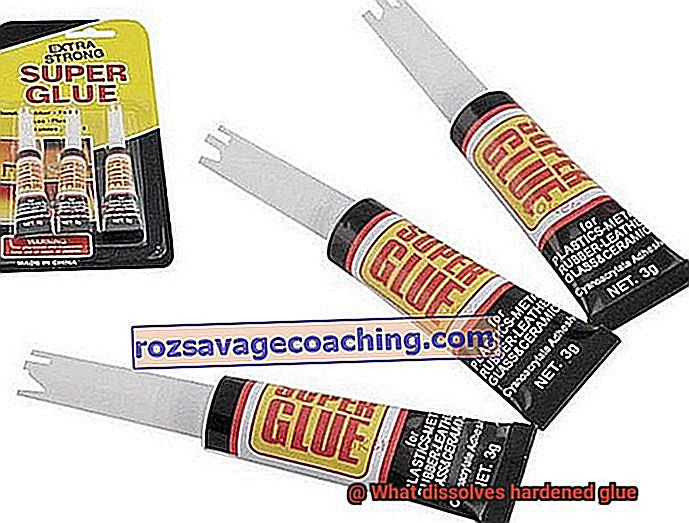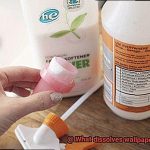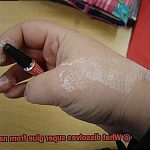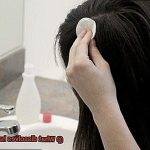Got a sticky situation on your hands? Whether you’re knee-deep in a DIY project or just trying to clean up a mess, hardened glue can be a real pain.
But don’t worry, I’ve got your back. In this blog post, we’re going to dive into the world of adhesive science and uncover the secrets to dissolving that stubborn glue.
We’ll explore a bunch of different methods – from everyday household products to fancy-pants specialized solvents – and learn how they work their magic on hardened glue. So whether you’re dealing with crusty crafts or sticky residue, get ready to arm yourself with all the knowledge you need to dissolve that pesky glue like a pro.
Let’s get started.
What is Hardened Glue?
Contents
- 1 What is Hardened Glue?
- 2 Common Household Items to Dissolve Hardened Glue
- 3 Acetone: Pros and Cons
- 4 Rubbing Alcohol: Pros and Cons
- 5 Vinegar: Pros and Cons
- 6 Warm Soapy Water: Pros and Cons
- 7 Specialty Glues: When to Seek Professional Advice
- 8 Safety Precautions for Working with Solvents or Chemicals
- 9 Conclusion
Glue is a versatile adhesive that finds its place in various aspects of our lives, from household repairs to creative projects. However, dealing with hardened glue can turn into a sticky situation that requires some expertise. In this article, we will delve into the world of hardened glue, exploring its nature, the different types available, and effective methods for its removal, all without causing any damage.
What is Hardened Glue?
Hardened glue refers to adhesive material that has dried and solidified. The process of hardening occurs when glue comes into contact with air, moisture, or heat, depending on the specific type of glue. Once the glue hardens, it forms an unyielding bond that can be challenging to remove.
Types of Hardened Glue:
- Epoxy Glue: Known for its unparalleled strength and durability, epoxy glue creates a rigid bond when fully cured. It is commonly used for bonding metals, ceramics, plastics, and other materials.
- Super Glue: Also called cyanoacrylate adhesive, super glue instantly forms a strong bond when exposed to moisture in the air. It dries to a clear, rock-solid finish and adheres firmly to various surfaces.
- Wood Glue: Designed specifically for wood surfaces, wood glue dries to a hard and inflexible state, ensuring a robust bond between wooden pieces.
- Hot Glue: A thermoplastic adhesive that melts upon heating and solidifies upon cooling. Hot glue provides an instantaneous and secure bond, making it popular for crafts and minor repairs.
Removing Hardened Glue:
- Acetone: A potent solvent found in nail polish remover, acetone effectively dissolves many types of glue. However, caution is advised as it may damage certain surfaces; therefore, testing it on a small area is crucial.
- Rubbing Alcohol: A milder alternative to acetone, rubbing alcohol is safe to use on most surfaces. By saturating a cloth or cotton ball with rubbing alcohol and applying it to the glue, it softens and becomes easily removable.
- Vinegar: With its acidic properties, vinegar aids in breaking down adhesive bonds. Soaking a cloth in vinegar, placing it over the glued area, and gently scraping off the softened glue can prove effective.
- Warm Soapy Water: A gentle solution suitable for certain types of glue, warm soapy water can soften the adhesive. Soak the affected area, then use a soft brush or sponge to gently scrub away the softened glue.
Common Household Items to Dissolve Hardened Glue
We’ve all found ourselves in sticky situations, struggling to remove hardened glue from surfaces. Whether it’s a spilled adhesive mishap or a DIY project gone wrong, the frustration is real. But fear not. In this article, we’ll explore a variety of common household items that can come to the rescue and dissolve hardened glue. Get ready to bid farewell to those stubborn sticky remnants.
Acetone: The Mighty Solvent
One of the most effective solvents for removing hardened glue is acetone. Found in nail polish removers, this potent solution is readily accessible in most households. Simply soak a cotton ball or cloth in acetone and apply it to the stubborn glue. Let it sit for a few minutes, allowing the acetone time to work its magic, before gently scrubbing away the dissolved glue.
Isopropyl Alcohol: Gentle Yet Powerful
Another handy household item is isopropyl alcohol, also known as rubbing alcohol. This versatile solution is less harsh than acetone and safe for use on various surfaces. Apply some isopropyl alcohol onto a cloth or sponge and rub it onto the hardened glue until it starts to loosen. Then, use a scraper or your fingernail to peel away the softened glue.
Vinegar: Nature’s Adhesive Breaker
For those who prefer natural remedies, vinegar can be a fantastic option for dissolving hardened glue. White vinegar, with its acidic properties, works wonders in breaking down adhesive bonds. Soak a cloth or paper towel in vinegar, place it over the glue for around 15 minutes, then gently scrape away the softened residue with a scraper or your fingers.
Warm Soapy Water: The Simplicity Solution
Sometimes, simplicity is key. Fill a basin or bucket with warm water and add a few drops of dish soap. Place the object with the hardened glue into the soapy water and let it soak for about 30 minutes. The warm water and soap combination will help loosen the adhesive properties of the glue, making it easier to remove. Then, scrub away the softened glue with a cloth or sponge.
Cooking Oil: A Surprising Savior
Don’t have any solvents on hand? No worries. Cooking oils such as vegetable or olive oil can also do the trick. Apply a generous amount of oil to the hardened glue and let it sit for a few minutes, allowing it to penetrate the adhesive. Use a cloth or sponge to gently rub the oil into the glue, breaking it down for easy removal. Once softened, scrape away the glue with a scraper or your fingernail.
Acetone: Pros and Cons
Glue can be a real nightmare to deal with when it hardens and leaves behind stubborn residue. Luckily, we have a superhero solvent called acetone that can come to the rescue. In this blog post, we’ll explore the pros and cons of using acetone to remove hardened glue, so you can make an informed decision about whether it’s the right solution for you.
Pros:
Effective Solvent:
Acetone, the mighty superhero, possesses incredible powers when it comes to dissolving hardened glue. Its strong solvent properties break down adhesive bonds quickly and effectively, making glue removal a breeze. Whether you’re dealing with super glue, epoxy, or any other type of adhesive, acetone is up for the challenge.
Fast Acting:
Time is precious, and acetone understands that. With lightning speed, this superhero solvent works its magic in no time, allowing you to remove hardened glue efficiently. Say goodbye to hours of scrubbing and scraping.
Versatile:
Acetone is not picky when it comes to surfaces. It fearlessly tackles glue on glass, metal, plastic, fabric, and many other materials. Whether you need to remove glue from a DIY project or a professional application, acetone has got your back.
Easily Accessible:
No need to go on a treacherous quest to find acetone. It’s readily available in most hardware stores, pharmacies, and beauty supply shops. Plus, it won’t break the bank, making it a convenient option for all your glue removal needs.
Cons:
Strong Odor:
Beware. Acetone comes with a powerful odor that can bring tears to your eyes or leave you gasping for fresh air. To avoid feeling like you’re working in a chemical lab, make sure to use acetone in a well-ventilated area or consider wearing a mask to shield yourself from the pungent fumes.
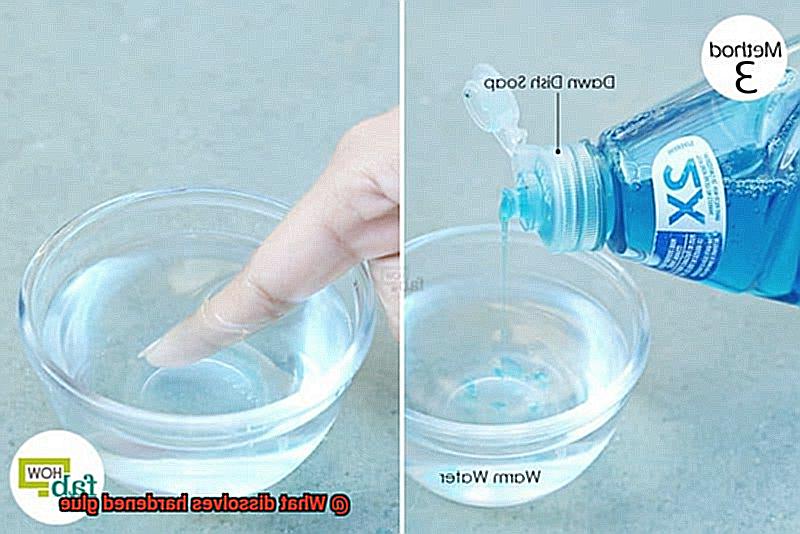
Potential Damage:
While acetone is great at dissolving glue, it can also cause collateral damage to certain surfaces. Before unleashing its power on the entire surface, it’s crucial to test acetone on a small, inconspicuous area to ensure compatibility and avoid any potential harm.
Flammable:
Acetone is not only a superhero solvent but also a flammable one. Handle it with care and keep it away from heat sources or open flames. Safety first.
Drying Effect:
Acetone may have the power to remove glue, but it can also have a drying effect on your skin and nails. To protect yourself, make sure to wear gloves when handling acetone. No need for superhero hands to suffer.
Rubbing Alcohol: Pros and Cons
Advantages:
Effectiveness:
Rubbing alcohol, also known as isopropyl alcohol, is a potent solute that breaks down the chemical bonds in glue, making it easier to remove. From super glue to industrial-strength adhesives, rubbing alcohol can dissolve a wide range of glues, making it a versatile option for any sticky situation.
Accessibility:
Finding rubbing alcohol is a breeze. It is readily available in most pharmacies or grocery stores and won’t break the bank. So when you’re in a pinch and need to remove hardened glue from various surfaces like glass, plastic, or metal, rubbing alcohol is your go-to solution.
Quick Evaporation:
Say goodbye to residue. Rubbing alcohol evaporates rapidly and leaves behind little to no residue. This is especially beneficial when dealing with delicate surfaces or materials sensitive to moisture. No more worrying about damage or staining after the glue has been dissolved.
Disadvantages:
Limited Effectiveness:
While rubbing alcohol is effective on most glues, some strong chemical compositions may require more specialized solvents for complete removal. It’s essential to consider the type of glue and surface before using rubbing alcohol as a solvent.
Flammability Risk:
Handle with care. Rubbing alcohol has a low flashpoint, which means it’s highly flammable. Keep it away from open flames or sparks and ensure proper ventilation when using it as a solvent.
Potential Surface Damage:
Rubbing alcohol can potentially damage certain surfaces or materials. Leather and specific types of plastics are particularly sensitive, as they may experience discoloration or deterioration. Always test a small, inconspicuous area before applying rubbing alcohol to the entire glue-stained surface.
Vinegar: Pros and Cons
Look no further than your trusty kitchen pantry. Vinegar, a common household ingredient, can be a powerful ally in dissolving hardened glue. In this blog post, we will explore the advantages and disadvantages of using vinegar for this task, helping you make an informed decision.
Advantages of using vinegar:
- Natural and non-toxic: Unlike chemical-based solvents, vinegar is completely safe to use around children and pets. It is devoid of any strong fumes or harmful vapors, making it an ideal choice for those with sensitivities or allergies.
- Affordability and availability: Vinegar is an easily accessible item found in practically every grocery store, and it won’t break the bank. This makes it a convenient option for homeowners who want to remove hardened glue without emptying their wallets.
Disadvantages of using vinegar:
- Limited effectiveness on certain glues: While vinegar can be effective on water-based glues, it may not work as effectively on stronger adhesives like epoxy or super glue. It’s crucial to consider the type of glue you’re dealing with before relying on vinegar as a solution.
- Time-consuming and labor-intensive: Removing hardened glue with vinegar may require multiple applications and vigorous scrubbing. This process can be quite time-consuming and labor-intensive, especially when dealing with larger or stubborn glue stains.
- Strong odor and potential surface damage: Vinegar has a potent odor that some individuals may find unpleasant. Additionally, its acidic nature can potentially damage surfaces such as delicate fabrics or wood finishes if not used properly.
Warm Soapy Water: Pros and Cons
Imagine the frustration of dealing with stubborn glue residue after completing a DIY project. But fear not, for warm soapy water may just be the magic potion you need. In this article, we will explore the pros and cons of using warm soapy water as a glue solvent, so you can make an informed decision and bid farewell to sticky situations.
Pros:
- Accessibility: Convenience is key when it comes to glue removal. Warm soapy water is a homemade remedy that is always within arm’s reach. No need to rush to the store for specialized solvents – just grab some soap and warm water, and voila.
- Gentle on Surfaces: Delicate surfaces rejoice. Warm soapy water is generally gentle and less likely to damage your precious belongings compared to stronger chemical solvents. From glass to plastic or even fabric, this versatile solution is a safe bet.
- Non-Toxic: Worried about exposing yourself or your loved ones to harmful substances? Worry no more. Warm soapy water poses no health risks if accidentally ingested or comes into contact with the skin. It’s a non-toxic solution that keeps you safe while getting the job done.
- Environmentally Friendly: As responsible citizens of Mother Earth, it’s important to consider the environmental impact of our actions. Luckily, warm soapy water is eco-friendly. It can be safely disposed of down the drain without causing harm to our planet.
Cons:
- Limited Effectiveness: Not all glues are created equal, and neither are their nemeses – warm soapy water. While it can work wonders on certain adhesives, some glue types require more powerful solvents for complete dissolution. So, keep in mind that warm soapy water may not be a cure-all for every sticky situation.
- Time-Consuming: Patience is a virtue, they say. And when it comes to removing hardened glue with warm soapy water, you’ll need that virtue in spades. Depending on the glue’s stubbornness and the length of time it has dried, be prepared for soaking and scrubbing to loosen and remove the adhesive.
- Not Suitable for All Surfaces: While warm soapy water is generally gentle, there are exceptions. Materials such as certain types of wood or electronics may react poorly to prolonged exposure to water or soap. So, exercise caution and test on a small, inconspicuous area before applying to larger surfaces.
- May Leave Residue: Ah, the aftermath of glue removal – the dreaded residue. Unfortunately, warm soapy water can sometimes leave behind a sticky residue that requires additional cleaning or the use of other solvents. So, be prepared for a little extra elbow grease.
Specialty Glues: When to Seek Professional Advice
You’ve embarked on a DIY project that requires the use of specialty glues like epoxy, cyanoacrylate (super glue), heat-activated, or UV-curing glues. You have all the necessary tools and materials, and you’re ready to get started. But before you dive in headfirst, it’s important to know when to seek professional advice.
Why is professional advice so crucial when it comes to using specialty glues? Well, these glues often come with unique properties and challenges that require expert knowledge to navigate. Let’s explore some situations where seeking professional advice is beneficial.
Firstly, safety concerns should be taken seriously. Some specialty glues can be hazardous if not used correctly. Professionals can guide you on proper safety measures such as wearing protective gear, working in a well-ventilated area, and handling potentially harmful chemicals safely.
Secondly, environmental factors play a significant role in successful bonding. Certain specialty glues may have specific temperature or humidity requirements for optimal bonding. Professionals can advise you on the ideal conditions for application to ensure a successful outcome.
Thirdly, applying specialty glues requires precision and skill. Professionals can teach you proper application techniques, such as applying the right amount of glue evenly and avoiding air bubbles or overapplication.
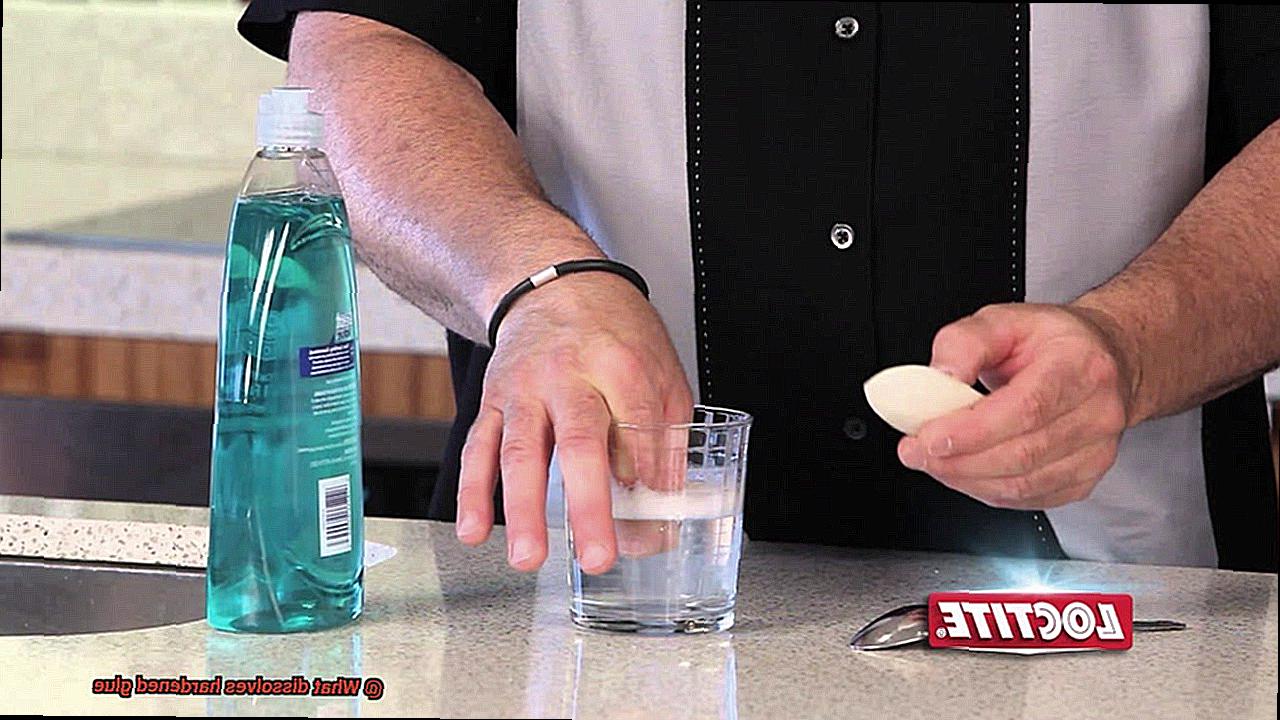
Moreover, different specialty glues have varying curing times, and rushing the process can result in weak bonds or failure. Professionals can provide guidance on the appropriate curing time for your specific project.
Furthermore, the success of any adhesive bond depends on proper surface preparation. Professionals can advise you on how to clean, roughen, or prime surfaces to achieve the best adhesion.
Lastly, if you find yourself dealing with hardened glue that needs to be removed, seeking professional advice is crucial. Improper removal methods can damage surfaces or even pose health risks.
When it comes to specialty glues like epoxy, cyanoacrylate, heat-activated, or UV-curing glues, it’s better to be safe than sorry. By seeking professional advice, you can avoid costly mistakes, ensure your project’s success, and protect yourself and your surroundings.
Remember, professionals have the knowledge and expertise to guide you through the entire process, from choosing the right glue for your project to its proper application and potential removal. So, before you embark on your next specialty glue adventure, consider reaching out to a professional for advice. It’s a small investment that can save you time, money, and frustration in the long run.
Safety Precautions for Working with Solvents or Chemicals
Working with solvents or chemicals can be an exhilarating and fulfilling experience, but it’s vital to prioritize safety precautions to safeguard yourself and others from potential hazards. To create a safe working environment, keep the following essential safety measures in mind:
- Personal Protective Equipment (PPE): Don gloves, goggles, and a lab coat or apron to shield your skin and eyes from direct contact with solvents or chemicals. This armor protects against irritation, burns, and other injuries that can occur during the process.
- Ventilation: Breathe easy. Work in a well-ventilated area or utilize a fume hood to minimize inhalation of vapors or fumes released during the dissolution process. By ensuring good air quality, you reduce the risk of respiratory issues.
- Familiarize Yourself with MSDS: Before commencing work, acquaint yourself with the Material Safety Data Sheet (MSDS) for the specific solvent or chemical you’re using. The MSDS provides crucial information about properties, hazards, and handling precautions.
- Work with a Buddy: Avoid solitary endeavors and ensure someone nearby is aware of your activities. A trusted companion can provide assistance in emergencies or accidents, allowing for prompt action and minimizing potential harm.
- Spill Kit: Be prepared. Keep a spill kit within arm’s reach, complete with absorbent materials, neutralizing agents, and proper disposal containers. This proactive approach guarantees swift cleanup and safe disposal of solvents or chemicals.
- Proper Storage and Disposal: Banish confusion. Never store solvents or chemicals in food or beverage containers to prevent accidental ingestion. Instead, use clearly labeled containers designed specifically for storage. When disposing of these substances, adhere to local regulations for proper waste management.
- Hand Hygiene: Wash away any lingering traces. Always thoroughly wash your hands with soap and water after working with solvents or chemicals, even if you wore gloves. This simple act removes any remnants from your skin, maintaining cleanliness and safety.
_59ZzuLJcTw” >
Also Read: How do you remove dried glue from rubber?
Conclusion
When it comes to tackling the stubborn grip of hardened glue, you need a solution that can dissolve its stronghold. Fortunately, there are several options at your disposal that can break down even the toughest adhesive bonds. From household items to specialized products, these remedies have one goal in mind: to free your surfaces from the clutches of sticky residue.
One effective way to dissolve hardened glue is by using acetone. This powerful solvent is commonly found in nail polish removers and paint thinners. Its chemical properties work wonders on glue, breaking it down and making it easier to remove. However, be cautious when using acetone on certain surfaces like plastic or painted materials, as it may cause damage.
Another trusty companion in your battle against hardened glue is rubbing alcohol. This versatile liquid not only disinfects wounds but also proves useful in dissolving adhesive messes. Simply apply some rubbing alcohol onto a cloth or cotton ball and gently rub away the glue until it loosens its grip.
If you’re looking for a more natural approach, vinegar might be your go-to option. This household staple has acidic properties that can effectively break down tough glues. Soak a cloth or sponge in vinegar and let it sit on the glued surface for a few minutes before scrubbing away the residue with ease.
For those seeking specialized solutions, there are commercial adhesive removers available on the market. These products are specifically designed to tackle stubborn glues and offer quick and efficient results. Just follow the instructions provided with the remover and watch as it effortlessly dissolves even the most hardened adhesives.
In conclusion, when faced with hardened glue that seems impossible to remove, don’t despair. With options like acetone, rubbing alcohol, vinegar, and commercial adhesive removers at your disposal, you can conquer this sticky situation with ease.

